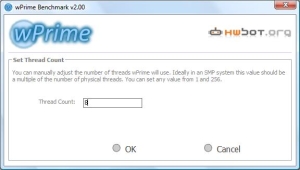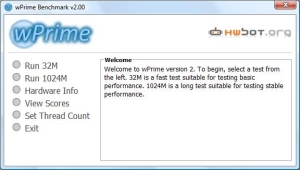WPrime
Download from: www.wprime.netWPrime is a multi-threaded maths calculation benchmark that counter-intuitively uses square roots rather than prime numbers. The standard benchmark uses 32 million numbers, calculating the square root via 'a recursive call of Newton's method for estimating functions'. We're not sure what that means either, but you can read the full blurb on WPrime's About page. What we do know is that WPrime scales well across multiple CPU cores, and can push a CPU to 100 per cent load on all its cores.
To run the benchmark, first visit the core count to check that WPrime will load all physical and logical cores, and then run the 32M test. The results are expressed as a time taken to calculate the square root of the set of numbers (32 million in the standard test). A lower score is better.
Clearly the highly multi-threaded wPrime benefits from the extra core doing a whole chunk more work than just a few extra MHz here: a prime example, like Cinebench, of how a heavily threaded application can actually work to the benefit of a slower, many cored CPU, if it's coded right. You'll have to have a need for specific application support to see a benefit though.
L3 cache makes no difference here because each core acts entirely independently, with the more efficient memory controller on the Athlon II X4 having a more positive benefit.
7-Zip
Download from: 7-ZipOur community requested the inclusion of 7-Zip, a free alternative to WinRAR, and we've obliged accordingly. We use the internal benchmark, which measures compression and decompression performance in MIPS and provides an average result. It is multi-threaded so takes advantage of the latest multi-core and HyperThreading enabled CPUs. We leave the benchmark to accumulate ten runs using a 32MB Dictionary size in order to get a solid, average result.
Just like wPrime above, 7-Zip makes use of the extra cores more efficiently than clock speed and creates a very clear lead against the fewer cored competition for the same money. There's just a smaller five per cent difference here compared to the full-fat Phenom II X4, which is smaller than the usual seven or eight per cent so clearly 7-Zip compression works very differently to WinRAR.

MSI MPG Velox 100R Chassis Review
October 14 2021 | 15:04











Want to comment? Please log in.